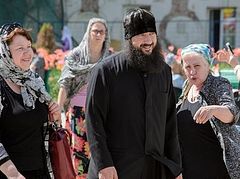The myrrh-bearing women are an image of the Church. Taken together they reveal the broad catholicity of the Church, for they were a diverse lot, and included both the conventional married woman, Mary the mother of Joses, and the highly unconventional Mary Magdalene. They also reveal the primacy of devotion to Jesus, for their mutual devotion to Him was the only thing that bound them together. And, not least, they also reveal the tremendous courage which must characterize the Church in this dark age.
The myrrh-bearers expressed the indomitable courage so often found in women. The myrrhbearers were women in what was emphatically a man’s world, and Jews in what was emphatically a Gentile world. They had no wealth or worldly influence in a world where practically nothing else counted apart from wealth and worldly influence. Yet despite these disadvantages they decided that they would meet together to confront the Roman soldiers guarding the Lord’s sealed garden tomb and ask that they unseal the tomb for them, that they roll back the massive stone over the door of the tomb, and that they be allowed to enter to anoint the body buried there. The whole project would be laughable if it were not also dangerous. It was a hopeless endeavour, and they would be lucky if they escaped the morning with nothing more than a blow to the head and a rude and rough ejection from the garden.
It is easy for us to become sentimental about the myrrh-bearers and so miss the courage that it took for them to approach the guards. We have (probably) never lived in a land occupied by a foreign and hostile power, as did the Jews in the Holy Land in the first century. If you want to gain some appreciation of their situation, try to imagine a group of Arab Palestinian women approaching a group of Israeli soldiers and asking for access in the morgue to wail over the body of a boy who had been killed as a terrorist. This will give some indication of the courage required by Jewish women approaching Roman soldiers tasked with keeping secure the corpse of a man who had just been executed as an enemy of the Roman state. These were gutsy women.
Their gutsy courage challenges us to face the world with the same kind of courage today. Sometimes one hears of people who seek out the Church because they imagine it to be a place of quiet refuge from the trouble and turmoil in the world, a kind of sanctuary where the gentle soul can find rest and peace. With all due respect to such gentle souls, such a view of the Church is the height of nonsense. It is like joining an army to avoid fighting. The Church is not the place where one can avoid spiritual conflict, just as the frontline in a war zone is not the place where one can avoid military conflict. The Church is an army, and obviously one joins an army with the intention of fighting, not of avoiding the fight.
And it doesn’t matter whether or not one chooses to fight, for if you make Jesus the center of your life in the Church, the Enemy will bring the fight to you. Not fighting is not an option. The only two options are: fight the Enemy and win, or let the Enemy take you out. Being left in peace by the Enemy is not going to happen. That is why St. Paul devotes so much space to spiritual conflict in his epistle to the Ephesians. The Enemy will attack every disciple of Jesus he finds, so there is nothing for it but to arm yourselves with the panoply of God and defend yourself. And note too: in the panoply St. Paul describes in Ephesians chapter six, there is a breastplate for the chest and a shield for the arm. There is nothing to shield and protect your back, for it is not expected that you will turn and run. It is expected that you will stand your ground and fight.
The Church is not simply the pillar and bulwark of the truth in this age, it is also the militia Christi, the army of Christ. And as any soldier will attest, it requires courage to serve in an army, especially when the battle heats up. In this army (in the words of an old Springsteen song), there can be no retreat, no surrender. A day will come when we can rest, and dry our tears, and find healing for our wounds, a day when we can hang up our swords and fight no more. But it is not this day. This day, in this age, we fight, and bleed, and sing. This day we will not let our sword sleep in our hand, but will fight on to our last breath, until we cross over and the trumpets of triumph announce our arrival in the Kingdom of God. In this day, we must show the indomitable courage of women. In this day, we follow the myrrh-bearers into battle under the banner of our King, and confront the world.





